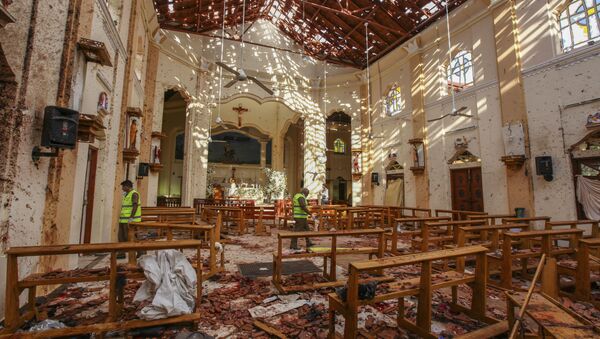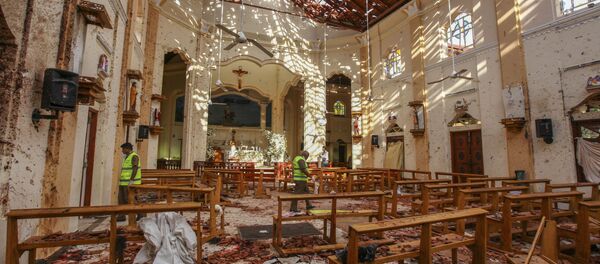New Delhi (Sputnik) — Admitting that important lessons have been drawn from the 21 April serial bombings in Sri Lanka, which claimed over 250 lives and injured over 500 others, Russian and Indian analysts on Monday said that more steps are required to mitigate terror-related multi-dimensional challenges.
The experts held discussions during a video conference held on the eve of Anti-Terrorism Day (21 May) which is annually observed to generate public awareness about the danger of terrorism and its negative impact on society. It was on this day in 1991 that India's former Prime Minister Rajiv Gandhi was assassinated by Sri Lankan rebel terrorist outfit, the Liberation Tigers of Tamil Eelam (LTTE) in the southern Indian state of Tamil Nadu.
READ MORE: Archbishop of Colombo Reportedly Accuses US, Daesh of Creating Conflicts
"The Daesh* has never been a structured terrorist outfit and as such has had no major impact globally. What we have seen in Sri Lanka is that it managed to leave an imprint. It indirectly managed to radicalise the youth and small groups sufficiently for them to carry out the attacks in the name of Islam and Jihad. There is no basis for the Daesh to take root in South Asia", Yuri Nagernyak, the director general of the Moscow-based International Foundation for the Promotion of Development of Culture, said, while commenting on the recent Easter Sunday attacks in Sri Lanka in April.
Alexie Kupriyanov, a researcher at the Russian Academy of Sciences Department of International Political Problems, said, "We need to historically understand how strong are the extremist sentiments in South Asia…Terrorism or extremism is of two types — conventional and non-conventional".
READ MORE: Outrage Over Swedish Church's Support Concert for 'Daesh Children'
"The non-conventional type relates to terrorists like the Daesh, who attack randomly from time-to-time, while the conventional types are those that are more traditional and constant. Examples of this are in Kashmir, Baluchistan and Afghanistan", the researcher said.
"We need a conducive political and economic environment to have an effective counter-terrorism strategy in place", Kupriyanov stressed.
"We have to deal with the menace of terrorism tactically on any forum, be it SAARC or the SCO etc. No terrorism can function without political, economic or any other kind of support. Radicalisation is a major issue. I don't think enough attention is being paid to it", Brigadier V. Mahalingam (Retired), a security affairs commentator, said.
*Daesh is a terrorist organisation banned in Russia and a number of other countries.
The views and opinions expressed in this article are those of the speakers and do not necessarily reflect official position of Sputnik.


